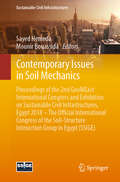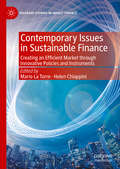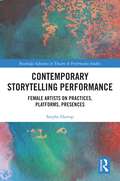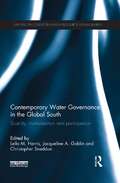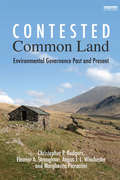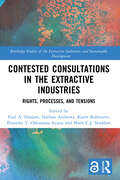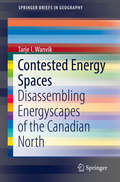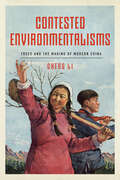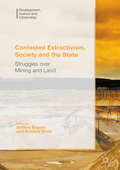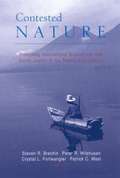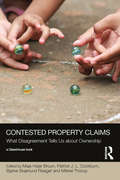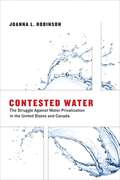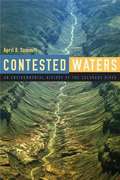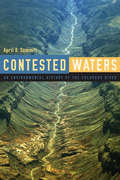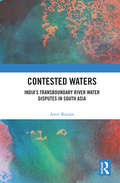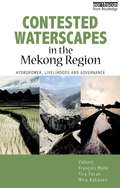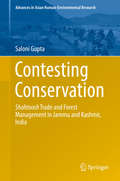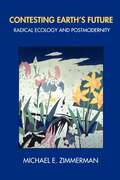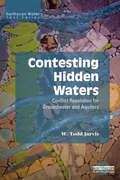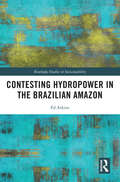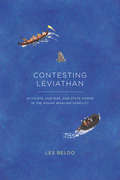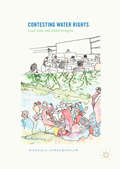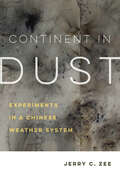- Table View
- List View
Contemporary Issues in Soil Mechanics: Proceedings of the 2nd GeoMEast International Congress and Exhibition on Sustainable Civil Infrastructures, Egypt 2018 – The Official International Congress of the Soil-Structure Interaction Group in Egypt (SSIGE) (Sustainable Civil Infrastructures)
by Mounir Bouassida Sayed HemedaThis volume is of interest to practical engineers. It discusses some contemporary issues related to soil mechanics in earthwork projects which are critical components in civil construction and often require detailed management techniques and unique solution methods to address failures. Being earth bound, earthwork is influenced by geomaterial properties at the onset of a project. Hence, an understanding of the in-situ soil properties is essential. Slope stability is a common problem facing earthwork construction, such as excavations and shored structures. Analytical methods for slope stability remain critical for researchers due to the mechanical complexity of the system. Striving for better earthwork project managements, the geotechnical engineering community continues to find improved testing techniques for determining sensitive properties of soil and rock, including stress-wave based, non-destructive testing methods. To minimize failure during earthwork construction, past case studies and data may reveal useful lessons and information to improve project management and minimize economic losses. This volume discusses these aspects using appropriate methods in a simple way. The volume is based on the best contributions to the 2nd GeoMEast International Congress and Exhibition on Sustainable Civil Infrastructures, Egypt 2018 – The official international congress of the Soil-Structure Interaction Group in Egypt (SSIGE).
Contemporary Issues in Sustainable Finance: Creating an Efficient Market through Innovative Policies and Instruments (Palgrave Studies in Impact Finance)
by Mario La Torre Helen ChiappiniSustainable investments, although not yet working under a comprehensive regulatory framework, represent a growing, worldwide phenomenon. Such growth reflects the renewed public and private interest in environmental issues such as climate change, poverty and financial inclusion, as well as growing support from conscious investors looking to finance environmental and social initiatives. However, despite the interest that sustainable investments are gaining among governors, investors and practitioners, important challenges remain that must be addressed. Comprising a collection of research presented at the 2nd Social Impact Investments International Conference, this contributed volume offers a global analysis of the current state of the sustainable finance sector, proposing solutions to challenging obstacles and exploring topics including impact investing, social impact bonds and green banking. Providing real-life case studies from Europe, Latin America and Africa, this book is an insightful and timely read for scholars interested in sustainable finance, social impact investing, development finance and alternative finance.
Contemporary Storytelling Performance: Female Artists on Practices, Platforms, Presences (Routledge Advances in Theatre & Performance Studies)
by Stephe HarropThis book focuses on a rising generation of female storytellers, analysing their innovation in interdisciplinary collaboration, and their creation of new multimedia platforms for story-led performance. It draws on an unprecedented series of in-depth interviews with artists including Jo Blake, Xanthe Gresham-Knight, Mara Menzies, Clare Murphy, Debs Newbold, Rachel Rose Reid, Sarah Liisa Wilkinson, and Vanessa Woolf, while Sally Pomme Clayton’s reflections on her extraordinary four-decade career provide long-term context for these cutting-edge conversations. Blending ethnographic research and performance analysis, the book documents the working lives of professional storytelling artists. It sheds light on the practices, values, aspirations, and achievements of a generation actively re-defining storytelling as a contemporary performance practice, taking on topics from ecology and maternity to griefwork and neuroscience, while working collaboratively with diverse creative partners to generate new, inclusive presences for a traditionally-inspired artform. This book will be of great interest to students, scholars, and practitioners in drama, theatre, performance, creative writing, education, and media.
Contemporary Water Governance in the Global South: Scarcity, Marketization and Participation (Earthscan Studies in Water Resource Management)
by Leila M. Harris, Jacqueline A. Goldin and Christopher SneddonThe litany of alarming observations about water use and misuse is now familiar—over a billion people without access to safe drinking water; almost every major river dammed and diverted; increasing conflicts over the delivery of water in urban areas; continuing threats to water quality from agricultural inputs and industrial wastes; and the increasing variability of climate, including threats of severe droughts and flooding across locales and regions. These issues present tremendous challenges for water governance. This book focuses on three major concepts and approaches that have gained currency in policy and governance circles, both globally and regionally—scarcity and crisis, marketization and privatization, and participation. It provides a historical and contextual overview of each of these ideas as they have emerged in global and regional policy and governance circles and pairs these with in-depth case studies that examine manifestations and contestations of water governance internationally. The book interrogates ideas of water crisis and scarcity in the context of bio-physical, political, social and environmental landscapes to better understand how ideas and practices linked to scarcity and crisis take hold, and become entrenched in policy and practice. The book also investigates ideas of marketization and privatization, increasingly prominent features of water governance throughout the global South, with particular attention to the varied implementation and effects of these governance practices. The final section of the volume analyzes participatory water governance, querying the disconnects between global discourses and local realities, particularly as they intersect with the other themes of interest to the volume. Promoting a view of changing water governance that links across these themes and in relation to contemporary realities, the book is invaluable for students, researchers, advocates, and policy makers interested in water governance challenges facing the developing world.
Contes De Mer
by Steve VernonSept histoires de mer sinistres qui vous feront vraiment flipper. Environ soixante-quinze de la planète sont recouvertes d'eau, et quatre-vingt-dix-sept se trouvent dans la mer. Les habitants de provinces maritimes vous diront que c’est une histoire pour chaque vague qui s'est jamais échoué sur le rivage. Ici sont sept d’entre eux. «Dans l’Obscurité et les Profondeurs», offre un récit très obsédant du devoir de convoi de la Seconde Guerre mondiale et d'un marin qui a fait et tenu une terrible affaire. «La Sirène d’Harry», vous présente un groupe des hommes sans abri qui ont attrapé quelque chose qui Pourrait être une sirène. Si cela ne vous en dit pas assez sur cette histoire, essayez d'imaginer ce que serait le CANNERY ROW de Steinbeck lirait s'il avait été écrit par HP Lovecraft. «Je sais Pourquoi les Eaux de la Mer ont le Goût du Sel,» est l'histoire d'un pilote suicide de l'armée de l'air japonaise basé à Okinawa et de sa rencontre avec un monstre marin - en quelque sorte. «L’Histoire de Finbar» est un sombre conte fantastique sur les courants profonds qui tourbillonnent et coulent à l'intérieur des courants calmes et profonds du cœur froid d'un homme. «La femme qui a perdu sa dent parce qu'elle riait trop fort de la mer», est une petite fable tranquille d'eau salée, de larmes et de regrets. «Entre Vous Savez Qui et le Bleu Foncé Profond» est l'histoire du dernier marché sur terre. Cette collection commence par une bonne affaire et se termine par une bonne affaire - ce qui me semble être une sacrée bonne affaire.
Contested Common Land: Environmental Governance Past and Present
by Christopher P. Rodgers Eleanor Straughton Angus J.L. Winchester Margherita PieracciniThis innovative and interdisciplinary book makes a major contribution to common pool resource studies. It offers a new perspective on the sustainable governance of common resources, grounded in contemporary and archival research on the common lands of England and Wales - an important common resource with multiple, and often conflicting, uses. It encompasses ecologically sensitive environments and landscapes, is an important agricultural resource and provides public access to the countryside for recreation. Contested Common Land brings together historical and contemporary legal scholarship to examine the environmental governance of common land from c.1600 to the present day. It uses four case studies to illustrate the challenges presented by the sustainable management of common property from an interdisciplinary perspective - from the Lake District, Yorkshire Dales, North Norfolk coast and the Cambrian Mountains. These demonstrate that cultural assumptions concerning the value of common land have changed across the centuries, with profound consequences for the law, land management, the legal expression of concepts of common 'property' rights and their exercise. The 'stakeholders' of today are the inheritors of this complex cultural legacy, and must negotiate diverse and sometimes conflicting objectives in their pursuit of a potentially unifying goal: a secure and sustainable future for the commons. The book also has considerable contemporary relevance, providing a timely contribution to discussion of strategies for the implementation of the Commons Act of 2006. The case studies position the new legislation in England and Wales within the wider context of institutional scholarship on the governance principles for successful common pool resource management, and the rejection of the 'tragedy of the commons'.
Contested Consultations in the Extractive Industries: Rights, Processes, and Tensions (Routledge Studies of the Extractive Industries and Sustainable Development)
by Paul A. HaslamThis volume examines how communities, companies, and governments contest and contribute to the evolution of norms, rules and decision-making procedures that govern stakeholder consultation in the extractive industries. In recent years international organisations, governments and companies around the world have dramatically reformed the regime that governs consultations with community stakeholders about proposed extractive projects. However, the characteristics of this consultation regime are often contested, with diverse stakeholders seeking to defend their interests by drawing on different authoritative interpretations of the rules, norms and decision-making procedures that govern stakeholder consultation. Contestation over the meaning, governance and practice of stakeholder consultation is the central thread that ties this book together. Within this overarching concern, the volume takes a global and comparative perspective that examines the complexity of these intersecting and overlapping consultation requirements, with a particular focus on Indigenous Peoples, using cases from the Global North and Global South, including Argentina, Australia, Brazil, Canada, The Central African Republic, The Democratic Republic of Congo, Iceland, Ghana, Greenland, Guyana, Norway, and Peru. The book highlights the tensions associated with the application of this contested regime and identifies possible solutions from best practices around the world. From a theoretical perspective the book unpacks the maze of overlapping consultation requirements and practices that highlights the normative disagreements between key stakeholders and the overlapping rules and procedures that govern the implementation of consultation. A unique contribution of this collection is the commentary from practitioners, who reflect on the same issues addressed by the academic contributors, but based on their own vast practical experience.This book will be of great interest to students and scholars researching public participation and stakeholder consultation in the extractive industries as well as natural resource governance and sustainable development more broadly.
Contested Energy Futures: Capturing the Renewable Energy Surge in Australia
by Stuart RosewarneThis book unpacks the politics of climate change in Australia in the context of successive conservative Coalition governments resisting any moves to mitigate emissions and as local communities and transnational corporations struggle with each other to control the transition to a sustainable energy future. As Australia has abundant clean energy resources in terms of solar and wind, the book offers a test case for study of the energy policy transition in the 21st century. It does so by using tools from political economy and sociology, teasing out public attitudes to renewable energy technologies and innovative infrastructure investments, unpacking the complex parameters of this historical debate, tracing the rise of household 'prosumers' and arguing the case for grassroots ownership of renewable infrastructure or 'energy sovereignty' - already pioneered by some isolated communities in Australia. The cultural and emancipatory benefits of cooperative ventures are well known. However, capitalism is not readily defeated by democracy. The promotion of individual households as 'virtual power stations', of 'smart technologies' and even of cryptocurrency into the energy transition innovative mix opens up ever new horizons for corporate control.
Contested Energy Spaces: Disassembling Energyscapes of the Canadian North (SpringerBriefs in Geography)
by Tarje I. WanvikThis authored brief discusses how to conceptualize the socio-material complexity of contested energy spaces in the Canadian North, specifically in the context of indigenous communities that have allowed industrial developments to occur on their lands despite the environmental and lifestyle consequences. By applying assemblage theory, the author identifies contested energy spaces as complex places or situations that need to be understood through geographical concepts of place, scale, and power. In 6 chapters, the book challenges preconceptions of indigenous peoples as victims by examining communities that favor industrial developments, and identifies instabilities in the Canadian North to analyze the power relations between industry, state and indigenous communities. The book will be of interest to undergraduate and graduate students, teachers and lecturers, and geography scholars.Chapter 1 introduces the concept of energy spaces, and addresses the main research question posed in the text; why do some indigenous communities support extractive industry developments on their traditional territories, despite substantial destruction of the local environment and traditional indigenous land use practices? Chapter 2 further elaborates on the conceptualization of contested energy spaces, and chapter 3 applies this to the study area in Alberta, Canada. Chapter 4 discusses the methodology of the research process, and chapter 5 presents empirical cases in Alberta, from the changing governance structures of energy spaces to the networking of local indigenous communities. Chapter 6 concludes the brief by summarizing he findings, and by offering advice to all stakeholders regarding the dangers of leaving government processes to market forces alone.
Contested Environmentalisms: Trees and the Making of Modern China
by Cheng LiFor decades, tree planting and forestry have been pivotal to Chinese environmentalism. During the Mao era, while forests were razed to fuel rapid increases in industrial production, the "Greening the Motherland" campaign promoted conservationist tree-planting nationwide. Contested Environmentalisms explores the seemingly contradictory rhetoric and desires of Chinese conservation from the early twentieth century through to the present. Drawing on literary, cinematic, scientific, archival, and digital media sources, Cheng Li investigates the emergence, evolution, and devolution of Chinese conservationist ideas. Combining literary, historical, and environmental studies approaches, he shows that these ideas acquired their value and assumed their power precisely because of their malleability and adaptability. Li historicizes authoritarian environmentalism and probes the global-local dynamics underlying conservationist ideas that energize environmental impulses in China. Examining ethnic borderlands, the Beijing political center, and China's growth on the world stage, this book demonstrates the strength of Chinese environmentalism to adapt and survive through tumultuous change lies in what seems to be a weakness: its inconsistency and contestation.
Contested Extractivism, Society and the State: Struggles over Mining and Land (Development, Justice and Citizenship)
by Bettina Engels Kristina DietzThis book empirically discusses recent struggles over land and mining, exploring state-society relations conflicts on various scales. In contrast with the existing literature, analyses in this volume deliberately focus on large-scale land use changes both in relation to the expansion of industrial mining and to agro-industry. The authors contend that there are significant parallels between contestations over different variants of resource extractivism, as they reflect the same global trends and processes. Chapters draw on critical theoretical approaches from political ecology, political economy, spatial theory, contentious politics, and the study of democracy. The authors not only provide empirical insights on actual resource struggles from different world regions based on in-depth field research, but also contribute to theory-building by linking concepts from various critical approaches to one another, developing a perspective for analysing struggles over resources related to current global crisis phenomena.
Contested Nature: Promoting International Biodiversity and Social Justice in the Twenty-First Century
by Patrick C. West Crystal L. Fortwangler Peter R. Wilshusen Steven R. BrechinThis book contends that effective biological conservation and social justice must go hand in hand.
Contested Property Claims: What Disagreement Tells Us About Ownership (Social Justice)
by Mikkel Thorup Maja Hojer Bruun Patrick Joseph Cockburn Bjarke Skærlund RisagerProperty relations are such a common feature of social life that the complexity of the web of laws, practices, and ideas that allow a property regime to function smoothly are often forgotten. But we are quickly reminded of this complexity when conflict over property erupts. When social actors confront a property regime – for example by squatting – they enact what can be called ‘contested property claims’. As this book demonstrates, these confrontations raise crucial issues of social justice and show the ways in which property conflicts often reflect wider social conflicts. Through a series of case studies from across the globe, this multidisciplinary anthology brings together works from anthropologists, legal scholars, and geographers, who show how exploring contested property claims offers a privileged window onto how property regimes function, as well as an illustration of the many ways that the institution of property shapes power relationships today.
Contested Water
by Joanna L. RobinsonAttempts by local governments to privatize water services have met with furiousopposition. Activists argue that to give private companies control of the water supply is to turnwater from a common resource into a marketized commodity. Moreover, to cede local power to a globalcorporation puts communities at the center of controversies over economic globalization. InContested Water, Joanna Robinson examines local social movement organizingagainst water privatization, looking closely at battles for control of local water services inStockton, California, and Vancouver, British Columbia. The movements in these two communities haddifferent trajectories, used different tactics, and experienced different outcomes. Robinsonanalyzes the factors that shaped these two struggles. Drawing on extensive interviews with movementactors, political leaders, and policymakers and detailed analysis of textual material, Robinsonshows that the successful campaign in Vancouver drew on tactics, opportunities, and narratives fromthe broader antiglobalization movement, with activists emphasizing the threats to local democracyand accountability; the less successful movement in Stockton centered on a ballot initiative thatwas made meaningless by a pre-emptive city council vote. Robinson finds that global forces arereshaping local movements, particularly those that oppose neoliberal reforms at the municipal level. She argues that anti--water privatization movements that link local and international concerns andbuild wide-ranging coalitions at local and global levels offer an effective way to counter economicglobalization. Successful challenges to globalization will not necessarily come from transnationalmovements but rather from movements that are connected globally but rooted in localcommunities.
Contested Waters
by April R. Summit"To fully understand this river and its past, one must examine many separate pieces of history scattered throughout two nations--seven states within the United States and two within Mexico--and sort through a large amount of scientific data. One needs to be part hydrologist, geologist, economist, sociologist, anthropologist, and historian to fully understand the entire story. Despite this river's narrow size and meager flow, its tale is very large indeed." --From the conclusion The Colorado River is a vital resource to urban and agricultural communities across the Southwest, providing water to 30 million people. Contested Waters tells the river's story-a story of conquest, control, division, and depletion. Beginning in prehistory and continuing into the present day, Contested Waters focuses on three important and often overlooked aspects of the river's use: the role of western water law in its over-allocation, the complexity of power relationships surrounding the river, and the concept of sustainable use and how it has been either ignored or applied in recent times. It is organized in two parts, the first addresses the chronological history of the river and long-term issues, while the second examines in more detail four specific topics: metropolitan perceptions, American Indian water rights, US-Mexico relations over the river, and water marketing issues. Creating a complete picture of the evolution of this crucial yet over-utilized resource, this comprehensive summary will fascinate anyone interested in the Colorado River or the environmental history of the Southwest.
Contested Waters: An Environmental History of the Colorado River
by April R. Summitt"To fully understand this river and its past, one must examine many separate pieces of history scattered throughout two nations--seven states within the United States and two within Mexico--and sort through a large amount of scientific data. One needs to be part hydrologist, geologist, economist, sociologist, anthropologist, and historian to fully understand the entire story. Despite this river's narrow size and meager flow, its tale is very large indeed." -From the conclusion The Colorado River is a vital resource to urban and agricultural communities across the Southwest, providing water to 30 million people. Contested Waters tells the river's story-a story of conquest, control, division, and depletion. Beginning in prehistory and continuing into the present day, Contested Waters focuses on three important and often overlooked aspects of the river's use: the role of western water law in its over-allocation, the complexity of power relationships surrounding the river, and the concept of sustainable use and how it has been either ignored or applied in recent times. It is organized in two parts, the first addresses the chronological history of the river and long-term issues, while the second examines in more detail four specific topics: metropolitan perceptions, American Indian water rights, US-Mexico relations over the river, and water marketing issues. Creating a complete picture of the evolution of this crucial yet over-utilized resource, this comprehensive summary will fascinate anyone interested in the Colorado River or the environmental history of the Southwest.
Contested Waters: India's Transboundary River Water Disputes in South Asia
by Amit RanjanThis book examines India’s transboundary river water disputes with its South Asian riparian neighbours — Pakistan, Bangladesh, Nepal and Bhutan. It explores the history of disputes and cooperation over the transboundary river water in this region as well as discusses current disputes and future concerns. It analyses how and why existing transboundary river water sharing treaties between India and its South Asian riparian neighbours are confronted with challenges. The book indicates that India’s transboundary river water disputes with its South Asian riparian neighbours are likely to escalate in coming years due to the widening of the demand¬–supply gap in the respective countries. It further shows the impact of bilateral relations on the resolution of transboundary river water disputes, even as cordial relationships do not always guarantee the absence of river water disputes between riparian states. The book looks at some key questions: How political are India’s transboundary rivers water disputes in South Asia? Why do the roots of India’s river water disputes with Bangladesh and Pakistan lie in the partition of the British India in 1947? Why are there reservations against India’s hydroelectricity projects or allegations of water theft? Is it possible to resolve transboundary river water disputes among these South Asian countries? This book will greatly interest scholars and researchers working in the areas of river management, environmental politics, transnationalism, water resources, politics and international relations, security studies, peace and conflict studies, geopolitics, development studies, governance and public administration, and South Asian studies in addition to policymakers and journalists.
Contested Waterscapes in the Mekong Region: Hydropower, Livelihoods and Governance
by François Molle Tira Foran Mira KäkönenThe catchment area of the Mekong River and its tributaries extends from China, through Burma/Myanmar, Thailand, Laos, Cambodia and to Vietnam. The water resources of the Mekong region - from the Irrawaddy and Nu-Salween in the west, across the Chao Phraya to the Lancang-Mekong and Red River in the east- are increasingly contested. Governments, companies, and banks are driving new investments in roads, dams, diversions, irrigation schemes, navigation facilities, power plants and other emblems of conventional 'development'. Their plans and interventions should provide some benefits, but also pose multiple burdens and risks to millions of people dependent on wetlands, floodplains and aquatic resources, in particular, the wild capture fisheries of rivers and lakes. This book examines how large-scale projects are being proposed, justified, and built. How are such projects contested and how do specific governance regimes influence decision making? The book also highlights the emergence of new actors, rights and trade-off debates, and the social and environmental consequences of 'water resources development'. This book shows how diverse, and often antagonistic, ideologies and interests are contesting for legitimacy. It argues that the distribution of decision-making, political, and discursive power influences how the waterscapes of the region will ultimately look and how benefits, costs and risks will be distributed. These issues are crucial for the transformation of waterscapes and the prospects for democratizing water governance in the Mekong region. The book is part of the action-research of the M-POWER (Mekong Program on Water, Environment and Resilience) knowledge network. Published with IFAD, CG|AR Challenge Program on Water & Food, M-POWER, Project ECHEL-EAU and HEINRICH BOLL STIFTUNG
Contesting Conservation
by Saloni GuptaThis book explores today’s changing intellectual climate, wherein understanding politics at different levels from global to local is considered mandatory in order to appraise the outcome of nature conservation interventions. By carefully examining two such processes – the ban on shahtoosh trade and the ‘National Afforestation Programme’ in the Indian state of Jammu and Kashmir, the book reveals how these processes are influenced by politics at different levels – from their introduction at the macro-level to their implementation at the micro-level – and in turn become coloured by the agendas and interests of the various stakeholders involved. Throughout the book, one priority is to give a voice to the poor resource-users who have been traditionally dependent on wildlife and forest resources for mere subsistence. Yet, these same people are who bear the brunt of nature conservation costs, rather than those actors who are responsible for the most serious violations in pursuit of greater profits. Contemporary Environmental Sociology is chiefly characterised by its focus on power relations in resource conservation and management. In ‘political ecology’ literature, too – especially after recognising the paradoxes and limitations of approaches such as ‘sustainable development’, ‘sustainable livelihoods’ and ‘community based natural resource management’ – there is a growing concern for critical analyses of multi-level politics in connection with nature conservation. The purpose of the book is not to challenge the gravity of environmental concerns, but to question the dominance of conservation interests over the subsistence needs of local communities, and to strike a balance between environmental and social justice. It argues that, unless and until more just accountability for the affected populations is ensured, conservation policies are unlikely to meet the goals of sustainable resource management. Given its critical engagement with human-nature conflicts in Jammu and Kashmir, the book offers a unique resource for students and scholars of Environmental Sociology, Political Ecology, Natural Resources Management, Conflict Studies and Human Rights Studies.
Contesting Earth's Future: Radical Ecology and Postmodernity
by Michael E. ZimmermanRadical ecology typically brings to mind media images of ecological activists standing before loggers' saws, staging anti-nuclear marches, and confronting polluters on the high seas. Yet for more than twenty years, the activities of organizations such as the Greens and Earth First! have been influenced by a diverse, less-publicized group of radical ecological philosophers. It is their work—the philosophical underpinnings of the radical ecological movement—that is the subject of Contesting Earth's Future.The book offers a much-needed, balanced appraisal of radical ecology's principles, goals, and limitations. Michael Zimmerman critically examines the movement's three major branches—deep ecology, social ecology, and ecofeminism. He also situates radical ecology within the complex cultural and political terrain of the late twentieth century, showing its relation to Martin Heidegger's anti-technological thought, 1960s counterculturalism, and contemporary theories of poststructuralism and postmodernity.An early and influential ecological thinker, Zimmerman is uniquely qualified to provide a broad overview of radical environmentalism and delineate its various schools of thought. He clearly describes their defining arguments and internecine disputes, among them the charge that deep ecology is an anti-modern, proto-fascist ideology. Reflecting both the movement's promise and its dangers, this book is essential reading for all those concerned with the worldwide ecological crisis.
Contesting Hidden Waters: Conflict Resolution for Groundwater and Aquifers (Earthscan Water Text)
by W. Todd JarvisThe world increasingly relies on groundwater resources for drinking water and the provision of food for a growing population. The utilization of aquifer systems also extends beyond freshwater supply to include other resources such as heat extraction and the storage and disposal of substances. Unlike other books about conflict resolution and negotiations over water resources, this volume is unique in focusing exclusively on conflicts over groundwater and aquifers. The author explores the specific challenges presented by these "hidden" resources, which are shown to be very different from those posed by surface water resources. Whereas surface watersheds are static, groundwater boundaries are value-laden and constantly changing during development. The book describes the various issues surrounding the governance and management of these resources and the various parties involved in conflicts and negotiations over them. Through first-hand accounts from a pracademic skilled in both process and substance as a groundwater professional and professional mediator, the book offers options for addressing the challenges and issues through a transdisciplinary approach.
Contesting Hydropower in the Brazilian Amazon (Routledge Studies in Sustainability)
by Ed AtkinsIn Contesting Hydropower in the Brazilian Amazon, Ed Atkins focuses on how local, national, and international civil society groups have resisted the Belo Monte and São Luiz do Tapajós hydroelectric projects in Brazil. In doing so, Atkins explores how contemporary opposition to hydropower projects demonstrate a form of ‘contested sustainability’ that highlights the need for sustainable energy transitions to take more into account than merely greenhouse gas emissions. The assertion that society must look to successfully transition away from fossil fuels and towards sustainable energy sources often appears assured in contemporary environmental governance. However, what is less certain is who decides which forms of energy are deemed ‘sustainable.’ Contesting Hydropower in the Brazilian Amazon explores one process in which the sustainability of a ‘green’ energy source is contested. It focuses on how civil society actors have both challenged and reconfigured dominant pro-dam assertions that present the hydropower schemes studied as renewable energy projects that contribute to sustainable development agendas. The volume also examines in detail how anti-dam actors act to render visible the political interests behind a project, whilst at the same time linking the resistance movement to wider questions of contemporary environmental politics. This interdisciplinary work will be of great interest to students and scholars of sustainable development, sustainable energy transitions, environmental justice, environmental governance, and development studies.
Contesting Leviathan: Activists, Hunters, and State Power in the Makah Whaling Conflict
by Les BeldoIn 1999, off the coast of the Pacific Northwest, the first gray whale in seven decades was killed by Makah whalers. The hunt marked the return of a centuries-old tradition and, predictably, set off a fierce political and environmental debate. Whalers from the Makah Indian Tribe and antiwhaling activists have clashed for over twenty years, with no end to this conflict in sight. In Contesting Leviathan, anthropologist Les Beldo describes the complex judicial and political climate for whale conservation in the United States, and the limits of the current framework in which whales are treated as “large fish” managed by the National Marine Fisheries Service. Emphasizing the moral dimension of the conflict between the Makah, the US government, and antiwhaling activists, Beldo brings to light the lived ethics of human-animal interaction, as well as how different groups claim to speak for the whale—the only silent party in this conflict. A timely and sensitive study of a complicated issue, this book calls into question anthropological expectations regarding who benefits from the exercise of state power in environmental conflicts, especially where indigenous groups are involved. Vividly told and rigorously argued, Contesting Leviathan will appeal to anthropologists, scholars of indigenous culture, animal activists, and any reader interested in the place of animals in contemporary life.
Contesting Water Rights: Local, State, And Global Struggles
by Mangala SubramaniamAs globalization processes and related neoliberal agendas promote privatization through state action, people’s struggles for rights to water have intensified. In this context, this book examines the role of the ambivalent state in local struggles for water, which are deeply intertwined with global forums that support and/or challenge the privatization of water resources. These local-global struggles have redefined the relationships between the state, corporations, and other social actors that impact the local politics of inequality and marginalization.
Continent in Dust: Experiments in a Chinese Weather System (Critical Environments: Nature, Science, and Politics #10)
by Jerry C. ZeeIn China, the weather has changed. Decades of reform have been shadowed by a changing meteorological normal: seasonal dust storms and spectacular episodes of air pollution have reworked physical and political relations between land and air in China and downwind. Continent in Dust offers an anthropology of strange weather, focusing on intersections among statecraft, landscape, atmosphere, and society. Traveling from state engineering programs that attempt to choreograph the movement of mobile dunes in the interior, to newly reconfigured bodies and airspaces in Beijing, and beyond, this book explores contemporary China as a weather system in the making: what would it mean to understand "the rise of China" literally, as the country itself rises into the air?
